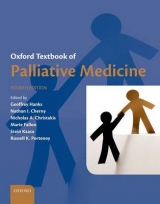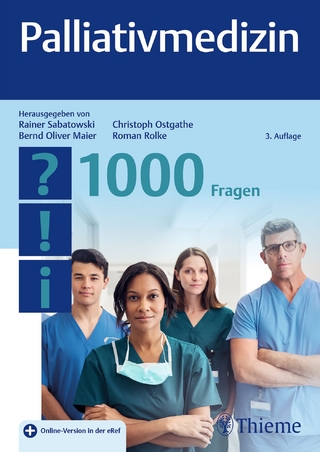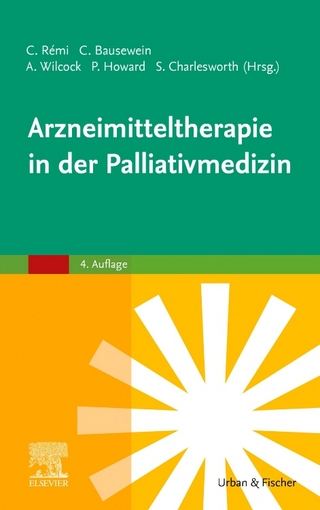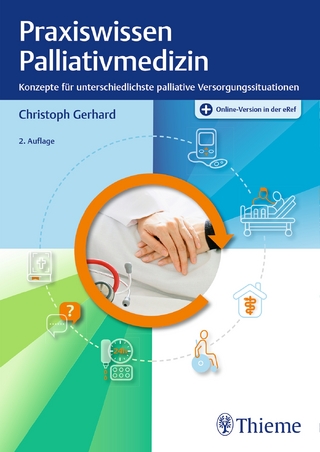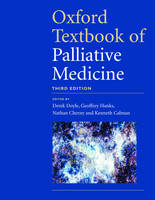
Oxford Textbook of Palliative Medicine
Oxford University Press (Verlag)
978-0-19-856698-4 (ISBN)
- Titel erscheint in neuer Auflage
- Artikel merken
The Oxford Textbook of Palliative Medicine has firmly established itself as the definitive book on the subject and is used in more than 8,000 palliative care services in over 100 countries. This new edition has been completely rewritten and revised to reflect the rapid growth of the specialty. Two world-famous doctors, Sir Kenneth Calman and Nathan Cherny, bring vast experience to the book and have joined Derek Doyle and Geoffrey Hanks on the editorial team. There are authoritative, international contributions from over 150 renowned experts. The book provides comprehensive coverage of ethical issues, communication, research, patient evaluation and outcome measures, the principles of drug use, symptom management, and the management of pain. Nutrition, paediatric palliative medicine, palliative medicine in non-malignant disease, cultural and spiritual issues, social, and work related issues, rehabilitation, complementary therapies, palliative medicine in the home, bereavement, and education and training are also covered in detail. The new edition includes sixty-six completely new chapters and contributors.New sections and chapters devoted exclusively to such non-malignant conditions as cardiac disease, non-malignant respiratory disease, non-malignant neurological disease and AIDS have been added as well as new chapters on palliative medicine in intensive care and geriatric care, and complementary and alternative therapies in palliative medicine.
There is a brand new section on the contributions to palliative care of occupational therapists, physiotherapists, music- , art- and speech- therapists, stoma therapists, clinical pharmacists and clinical psychologists. Every chapter used in the first two editions has been radically reviewed and brought up to date. A striking new page and cover design reflects the significant changes made in this edition. Like its predecessors, OTPM3 will be the trusted and ultimate reference which no palliative care service or medical library can afford to be without.
Foreword; SECTION 1: INTRODUCTION; 1.1 Introduction; SECTION 2: THE CHALLENGE OF PALLIATIVE MEDICINE; 2.1 The problem of suffering; 2.2 The epidemiology of death and symptoms; 2.3 Palliative medicine and modern cancer care; 2.4 Predicting survival in patients with advanced disease; 2.5 The interdisciplinary team; 2.6 Economics based palliative medicine; SECTION 3: ETHICAL ISSUES; 3.1 Introduction; 3.2 Confidentiality; 3.3 Truth-telling and consent; 3.4 Educating for professional competence in palliative medicine; 3.5 Palliative medicine and children: ethical and legal issues; 3.6 Ethical issues in palliative care research; 3.7 Euthanasia and withholding treatment; SECTION 4: COMMUNICATION AND PALLIATIVE MEDICINE; 4.1 Communication with the patient and family in palliative medicine; 4.2 Communication with professionals; 4.3 Communication with public, politicians and media; SECTION 5: RESEARCH IN PALLIATIVE MEDICINE; 5.1 The principles of evidence-based medicine; 5.2 Clinical research in palliative medicine: practical considerations; 5.3 Qualitative research in palliative medicine; 5.4 Pain research - the design of clinical trials; 5.5 Research into psychosocial issues; SECTION 6: PATIENT EVALUATION AND OUTCOME MEASURES; 6.1 The measurement of pain and other symptoms; 6.2 Are we doing the right thing well: assessing and maintaining the quality of care?; 6.3 Quality of life in palliative medicine - principles and practice; SECTION 7: PRINCIPLES OF DRUG USE IN PALLIATIVE MEDICINE; 7.1 Principles of drug use in palliative medicine; SECTION 8: SYMPTOM MANAGEMENT; 8.1 Disease modifying management; 8.1.1 Palliative medicine and the treatment of cancer; 8.1.2 Radiotherapy in symptom management; 8.1.3 Surgical palliation; 8.1.4 Orthopaedic principles and management; 8.1.5 Interventional radiology; 8.2 The management of pain; 8.2.1 Pathophysiology of pain in cancer and other terminal diseases; 8.2.2 Acute and chronic cancer pain syndromes; 8.2.3 Opioid analgesic therapy; 8.2.4 Non-opioid analgesics; 8.2.5 Adjuvant analgesics in pain management; 8.2.6 Anaesthetic techniques for pain management; 8.2.7 Neurosurgical techniques in the management of pain; 8.2.8 Treating pain with transcutaneous electrical nerve stimulation (TENS); 8.2.9 Acupuncture; 8.2.10 Psychological and psychiatric interventions in pain control; 8.2.11 Difficult pain problems - an integrated approach; 8.3 Gastro-intestinal symptoms; 8.3.1 Palliation of nausea and vomiting; 8.3.2 Dysphagia, dyspepsia and hiccup; 8.3.3 Constipation and diarrhoea; 8.3.4 Pathophysiology and management of malignant bowel obstruction; 8.3.5 Jaundice, ascites and hepatic encephalopathy; 8.4 Nutrition in palliative medicine; 8.4.1 Pathophysiology of the Anorexia/Cachexia syndrome; 8.4.2 Clinical assessment and decision making in cachexia and anorexia; 8.4.3 Dietary and nutritional aspects of palliative medicine; 8.4.4 Pharmacological interventions in cachexia and anorexia; 8.5 Fatigue and asthenia; 8.6 Clinical management of anaemia, cytopenias and thrombosis in palliative medicine; 8.7 Pruritus and sweating in palliative medicine; 8.8 Palliative medicine in malignant respiratory diseases; 8.9 Skin problems in palliative medicine; 8.9.1 Medical aspects; 8.9.2 Nursing aspects; 8.9.3 Lymphoedema; 8.10 Genito-urinary problems in palliative medicine; 8.11 Palliative issues in the care of patients with cancer of the head and neck; 8.12 Mouth care; 8.13 Endocrine and metabolic complications of advanced cancer; 8.14 Neurological problems in advanced cancer; 8.15 Primary brain tumours; 8.16 Sleep in palliative medicine; 8.17 Psychiatric symptoms in palliative medicine; SECTION 9: PAEDIATRIC PALLIATIVE MEDICINE; 9.1 Pain control; 9.2 The symptom management of children with life-limiting illness; 9.3 Psychological adaptation of the dying child; 9.4 Care of the dying child and adolescent - family adjustment and support; 9.5 Special consideration for children in palliative medicine; 9.6 Bereavement issues and staff support; SECTION 10: PALLIATIVE MEDICINE IN NON-MALIGNANT DISEASE; 10.1 Introduction; 10.2 AIDS in adults; 10.3 Palliative medicine for children and adolescents with HIV/AIDS; 10.4 Palliative medicine and non-malignant, end-stage respiratory disease; 10.5 Palliative medicine for patients with end stage heart disease; 10.6 Palliative medicine in non-malignant neurological disease; 10.7 Palliative medicine and care of the elderly; 10.8 Palliative medicine in intensive care; SECTION 11: CULTURAL AND SPIRITUAL ASPECTS OF PALLIATIVE MEDICINE; 11.1 Cultural and spiritual aspects of palliative medicine; SECTION 12: EMOTIONAL PROBLEMS IN PALLIATIVE CARE; 12.1 The emotional problems of the patient in palliative medicine; 12.2 Emotional problems in the family; 12.3 The stress of professional caregivers; SECTION 13: SOCIAL WORK IN PALLIATIVE MEDICINE; 13.1 Social work in palliative medicine; SECTION 14: REHABILITATION IN PALLIATIVE MEDICINE; 14.1 Rehabilitation in palliative medicine; SECTION 15: THE CONTRIBUTION TO PALLIATIVE CARE OF PROFESSIONS ALLIED TO MEDICINE; 15.1 The contribution of occupational therapy to palliative medicine; 15.2 The contribution of music therapy to palliative medicine; 15.3 The contribution of the dietician and nutritionist to palliative medicine; 15.4 The contribution of physiotherapy to palliative medicine; 15.5 The contribution of speech and language therapy to palliative medicine; 15.6 The contribution of art therapy to palliative medicine; 15.7 The contribution of stoma therapy to palliative medicine; 15.8 The contribution of clinical psychology to palliative medicine; 15.9 The contribution of the role of the pharmacist to palliative medicine; 16.1 COMPLEMENTARY THERAPIES IN PALLIATIVE MEDICINE; SECTION 17: PALLIATIVE MEDICINE IN THE HOME; 17.1 Palliative medicine in the home; 17.2 Palliative care in the home: North America; SECTION 18: THE TERMINAL PHASE; 18.1 The terminal phase; SECTION 19 BEREAVEMENT; 19.1 Bereavement; SECTION 20: EDUCATION AND TRAINING IN PALLIATIVE MEDICINE; 20.1 Introduction; 20.2 Training the family physician; 20.3 Training specialists in palliative medicine; 20.4 Learning and using counselling skills in palliative medicine; 20.5 The role of the humanities in palliative medicine; 20.6 Internet and IT learning; SECTION 21: PALLIATIVE MEDICINE: A GLOBAL PERSPECTIVE; 21.1 Palliative medicine: a global perspective
| Erscheint lt. Verlag | 1.4.2005 |
|---|---|
| Co-Autor | Derek Doyle, Nathan Cherny, Kenneth Calman |
| Zusatzinfo | numerous black & white photographs and line illustrations |
| Verlagsort | Oxford |
| Sprache | englisch |
| Themenwelt | Medizin / Pharmazie ► Medizinische Fachgebiete ► Palliativmedizin |
| ISBN-10 | 0-19-856698-0 / 0198566980 |
| ISBN-13 | 978-0-19-856698-4 / 9780198566984 |
| Zustand | Neuware |
| Haben Sie eine Frage zum Produkt? |
aus dem Bereich
